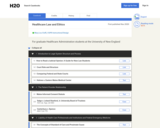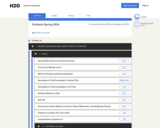
42 Results


This casebook is designed for a basic course in U.S. federal criminal law. Materials are selected for particular attention on transnational applications of federal law. To that end, the book integrates materials on international law, especially as it is recognized by or incorporated into U.S. law; informs assertions of jurisdiction on conduct outside of U.S. territory; affects the scope of congressional authority; and regulates the activities of U.S. agencies outside U.S. territory. Substantive topics include trafficking offenses; fraud, bribery and corruption offenses; terrorism crimes; conspiracy; and obstruction of justice.
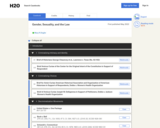
There are few areas of the law that are currently more contested than gender, sexuality, and reproduction. Indeed, fundamental questions of justice and equality arise when the law regulates the most intimate aspects of personal life. Debates rage in legislatures about abortion, contraception, education about sexual orientation and gender identity, marriage equality, assisted reproductive technologies, and employment discrimination. This casebook explores the history, law, and social movement struggles around key issues of gender, sexuality, and reproduction. We will consider the historical trajectories of these laws, from criminalization to deregulation and beyond. We will think through what the law means by gender identity, sexual orientation, sex, and reproduction--and whether those definitions are satisfying. We will think through the practical effects of different legal approaches and the cultural, medical, and political crosscurrents that shape them. Whatever else one may say about gender, sexuality, and the law, it is fluid, and the readers of this volume will have a significant hand in shaping its future.
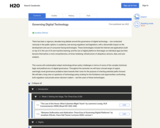
There has been a vigorous, decades-long debate around the governance of digital technology – one conducted variously in the public sphere, in academia, and among regulators and legislators, with a discernible impact on the development and use of consumer-facing technologies. These technologies include the Internet and applications built on top of it; the use of AI and machine learning; and the rise of digital platforms that began as individual apps but then became themselves a more comprehensive, at times totalizing, infrastructure of ubiquitous sensors, data, and user analysis. This course will contextualize today’s technology-driven policy challenges in terms of some of the complex technical, legal, and political arcs of digital governance. Throughout the semester we will trace a broad range of urgent, seemingly novel governance problems back towards their roots for the purpose of charting potential paths forward. We will take a long view on questions of technology policy, looking for the limitations and opportunities confronting both regulators and private-sector decision makers -- and the users of these technologies.
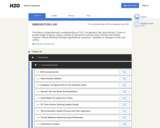
Provides a comprehensive understanding of U.S. immigration law and policies. Covers a broad range of topics using a variety of resources such as news articles and media. Fosters critical thinking through hypothetical scenarios. Updates on changes in law and policy.
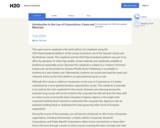
This open-source casebook is the tenth edition of a casebook using the H2O/OpenCasebook platform of the Library Innovation Lab of the Harvard Library and the Berkman Center. This casebook and the H2O/OpenCasebook platform are part of an effort by educators to make high quality course materials and casebooks available to students at reasonable prices. Because this casebook is subject to a Creative Commons license and can be printed via Amazon/Kindle Direct Publishing, it is available to students at a very modest cost. Alternatively, students can access and read the cases and materials online via the H2O platform at opencasebook.org at no cost. Although this course is called an Introduction to the Law of Corporations, it is better understood as a more general business organizations course. This casebook is intended to be used as the main casebook for this course. However, your learning during this semester-long course will not be limited to the corporate law. We will start the class with an online course covering the basic concepts of Agency. Agency is the single most important building block required to understand the corporate law. Agency is also an essential building block to understand the laws governing other forms of business organization. During the course of this semester, you will also be introduced to other forms of business organization, including Partnerships, Limited Liability Companies, Nonprofit Corporations, and Public Benefit Corporations. Most of your introduction to these other forms will come through a series of online courses covering the basic concepts and rules for each of the forms. You should plan to complete all of these courses, including the accompanying quizzes in Canvas, by the dates set forth in the syllabus. While you are working on these online courses, in class we will focus on the corporate form, the Delaware corporate code, and the Delaware common law of corporations.Because the corporate law is so much more extensive than the laws of other business forms, like for example the law governing LLCs, courts often lean heavily on the corporate law and apply it by analogy to other forms when they are in search of persuasive authority. By becoming expert in the corporate law, you will find it easy to translate that knowledge and apply it other business organizations. Much of the work of the corporate lawyer starts with the code. As such, we will start with an in depth examination of the corporate code. Although we could study the Model Code or the Massachusetts code, for most corporate lawyers, the Delaware corporate law will be central to their practice. Sixty percent of all publicly traded corporations are Delaware corporations. With respect to private corporations, they are typically incorporated in the state in which they are physically located, or they are incorporated in Delaware.Beyond the code, Delaware has a very deep corporate common law. It is in the corporate common law that the courts have developed the law of corporate fiduciary duties. It is through fiduciary duties that the corporate law attempts to regulate the relationship between stockholders and the corporation, between managers and the corporation, as well as the relationships of controlling stockholders and minority stockholders. Delaware's treatment of the corporate common law is so extensive that it is not at all uncommon at all for the courts of other states to refer to, or cite Delaware corporate law cases, when deciding questions involving their own corporate law. The Delaware corporate law is the closest we have to a lingua franca in the US for corporate law.The fiduciary duties of corporate directors are tested most often in the context of corporate takeovers. The corporate takeover materials in this casebook attempt to highlight the most important issues in takeover situations as well as the court's doctrinal efforts to mitigate the transaction costs that arise in these situations.
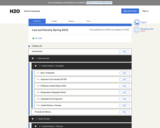
The links in this casebook nearly all come from the docket (list of documents filed) for your case. When a cert petition is filed, it is assigned a "docket number." The first 2 numbers are the year in which the petition was filed. The numbers after the hyphen signify filing order.
Supremecourt.gov has case dockets online. Oral Argument audio and transcripts are also available through that website or oyez.
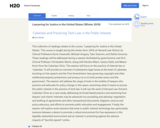
This collection of readings relates to the course, "Lawyering for Justice in the United States." The course is taught during the winter term, 2019, at Harvard Law School, by Clinical Professors Esme Caramello, Michael Gregory, Tyler Giannini, and Dehlia Umunna. These readings will be addressed during a session facilitated by guest lecturer and HLS Clinical Professor Christopher Bavitz, along with Kendra Albert, Jessica Fjeld, and Mason Kortz from the Cyberlaw Clinic. The session will focus on the practice of Internet law or "cyberlaw." It will provide an overview of substantive legal issues at the heart of cyberlaw, touching on free speech and the First Amendment; laws governing copyright and other intellectual property protections; and privacy vis-à-vis both private actors and the government. The session will address the range of tools in the toolkits of lawyers who practice and advocate for policy change in this space, examining what it means to pursue the public interest in the practice of tech law. It will use the work of Harvard Law School's Cyberlaw Clinic as a case study, addressing its broad-based practice and examining how lawyers' and clients' interests may be advanced via counseling and advising; negotiation and drafting of agreements and other transactional documents; litigation; amicus and policy advocacy; and efforts to promote public education and engagement. Finally, the session will explore some tensions that arise in public interest technology law, particularly tensions between a desire to promote a robust environment for free expression in the digitally-networked environment and an interest in protecting against the adverse impacts of "harmful speech" online.
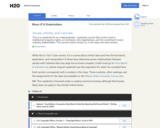
While this is *not* a law course, it is a course about certain laws and how the formation, application, and manipulation of those laws determine power relationships between parties with interests that may align but at times compete. Credit must go to Chris Bavitz at Harvard Law, whose original casebook was the inspiration for what I've compiled here. Each section corresponds with a module in the class. Those modules, other readings, and the assignments for the class are available on the Wayne State University Canvas site. NB: This casebook is licensed under a creative commons license, although that license likely does not apply to the articles linked herein.

This course explores legal issues relating to the creation, exploitation, and protection of music and other content. It focuses on traditional regimes and models and the ways new technologies have affected strategies involved in making and distributing content. The seminar balances doctrinal and policy concerns with day-to-day legal and business practices and skills relevant to practitioners.
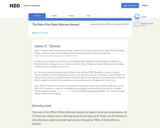
The roots of the Office of State Attorney General run deep in American jurisprudence. All 13 American colonies had an Attorney General and today all 50 States and the District of Columbia have opted to provide legal services through an Office of State Attorney General.Each office possesses broad jurisdiction and to varying degrees is independent from the executive and the legislative branches of state government. Attorneys general in 43 states and the District of Columbia are elected statewide on a partisan basis. The combination of sweeping jurisdiction and constitutional independence has given rise to a unique American legal institution of growing importance.This Syllabus covers the day-to-day challenges faced by attorneys general and their staff in delivering the legal advice that will guide state government in a constitutional and ethical manner. It also covers the relationship of attorneys general with Governors, state legislatures and agencies, the federal government, the private bar, and a myriad of advocacy organizations. It focuses both day to day responsibilities as well as on some of the most controversial legal issues affecting society today. Although attorneys general are often in the news litigating both in favor and in opposition to Presidential policies, the focus of this Syllabus is not on suing or defending a President.Although each state is unique, the course demonstrates the remarkable congruence that exists among state attorneys general when addressing similar challenges and issues. The course is weighted toward those decisions by attorneys general that reflect their independent status, which is most often revealed when attorneys general assert that Governors, legislatures, other elected officials, state agencies or the federal government exceed their constitutional or statutory authority. The course also considers also the unique ethical issues that attorneys general and their staff must confront.This Syllabus contains federal and state statutes and case law, law review and descriptive articles from a variety of sources, and hypotheticals that describe the nature and function of the Office of State Attorney General. The numerous hypotheticals are drawn from actual cases that, because of their nature, have not been studied or, in most cases, ever made public. All materials have been collected from over 40 years of studying and participating in the decision making of attorneys general and their staff.There are numerous ways to teach a course on attorneys general. This Syllabus is specifically designed to give to law school instructors or continuing education providers information that may not be otherwise available. This format also allows an instructor maximum flexibility in designing a course or training.There are many ways to evaluate the performance of students. In Harvard classes students are evaluated based upon either a final take-home examination or, if approved by the instructors, a paper. Given the dearth of academic writing on state attorneys general in particular, and on state issues in general, students are encouraged to consider writing a paper as attorneys general present fertile ground for academic research.Readings that are marked “supplemental reading" are optional resources that enable students to take a deeper dive into that week’s topic. At several law schools instructors ask each student is asked to "adopt" a specific incumbent attorney general and follow them throughout the semester. For a list of courses at a sampling of law schools, see:https://www.stateag.org/initiatives/teaching-about-attorneys-general-in-law-schoolAlt Harvard all students are expected to participate in some fashion each week in class. Because many, if not most, of the decisions of attorneys general and their staff are based upon judgment, and thus are not obviously right nor wrong, the class seeks to create an atmosphere where students of differing political perspectives will feel comfortable contributing diverse viewpoints to the class discussion. Class participation can be taken into grading decisions.In anticipation of the first Harvard class, all students are required to watch this video (https://www.youtube.com/watch?v=oeNZ6_Vzy7I&feature=emb_title): A Brief Introduction to the World of State Attorneys General
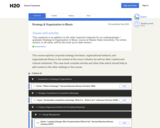
This course explores corporate strategy formation, organizational behavior, and organizational theory in the context of the music industry (as well as other creative and cultural industries). This case book compiles articles and other links which should help to add context to the other readings in the course.
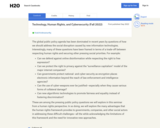
The global public policy agenda has been dominated in recent years by questions of how we should address the social disruption caused by new information technologies. Interestingly, many of these questions have been framed in terms of a trade-off between respecting human rights and securing other pressing social priorities. For example: Can we defend against online disinformation while respecting the right to free expression?Can we protect the right to privacy against the “surveillance capitalism” model of the major internet companies?Can governments protect national- and cyber-security as encryption places electronic information beyond the reach of law enforcement and intelligence agencies?Can the use of cyber-weapons ever be justified—especially when they cause various forms of collateral damage?Can new algorithmic technologies to promote fairness and equality instead of fostering discrimination?These are among the pressing public policy questions we will explore in this seminar from a human rights perspective. In so doing, we will explore the many advantages that the human rights framework provides to governments, companies, and other social actors in addressing these difficult challenges—all the while acknowledging the limitations of this framework and the need for innovative new approaches.

What is a tort? A tort is a civil wrong, not arising from contract, recognized by a court. Often, tort suits begin when one private citizen goes to court and calls another to account—and seeks money in compensation for whatever that defendant allegedly committed.

At its core, tort law defines the duties we owe each other — whether we are parents, government officials, business owners, or mere bystanders — and what we should do when those duties are not met. Tort law attempts to make the injured whole and set societal norms. Unlike criminal law, it rarely involves the threat of state action: it is merely an organized system of allowing one person to peaceably bring a grievance against another. Although there are tort systems throughout the world, this private system of personal responsibility and enforcement is quintessentially American.


